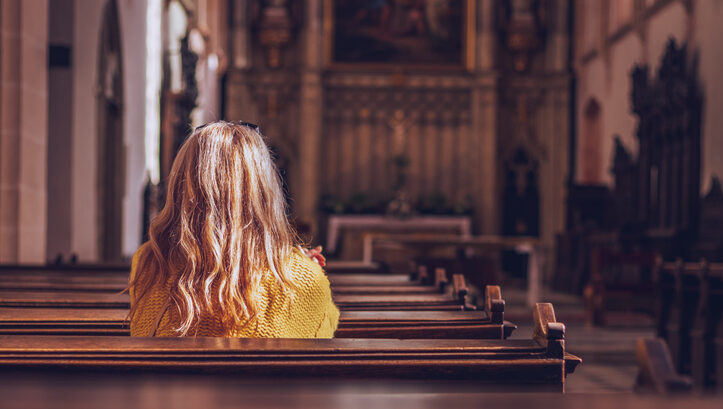Religious observance is declining—Gallup reports, and Dr. Michael Brown said it shows “…how far we have fallen.”
By Eileen Griffin
Church attendance remains lower than before the COVID-19 pandemic.
Gallup reports a significant drop in attendance at religious services, based on polling. Attendance levels are about 10 percent lower than in 2012 and most other years.
Many people attended religious services remotely during the pandemic, but even including those who continue to follow a church through video the numbers were still low.
Regardless of the subgroup studied, all categories showed a drop in religious attendance since 2020. Church participation declined among Democrats, Republicans, and Independents.
Republicans continue to be more committed to religion, with a 40 percent participation rate, while the number for self-described Democrats was 25 percent.
‘How Far We Have Fallen’
Dr. Michael Brown, author, podcast host, and an international speaker on spiritual renewal and cultural reformation told Heartland Daily News the drop in church attendance coincides with the growth of the LGBTQ+ movement.
“It’s why so many people have left the church,” said Brown. “If gay is good, church is bad. Many people have friends, family, co-workers, who are gay, bisexual, or transgender. They think they are nice. They understand that the church is against them, so they side with their friends rather than God, the church, the Bible.”
In addition to church attendance, behavior and attitudes reflect a lack of interest in morality and traditional values. Columnist Bill O’Reilly says the United States is becoming a secular nation.
“The decline of religious commitment is, of course, being felt in crime, narcotics consumption, personal betrayal, extreme behavior, and even disrespecting religion, as the Los Angeles Dodgers recently did by honoring an anti-Christian hate group,” O’Reilly wrote.
“We need to see how far we have fallen,” Brown told Heartland Daily News. “We need to remember how fundamental freedom of religion was and see the degree that the change has come. We need to take a serious look at the erosion of our beliefs. The very fact that we would celebrate an anti-Christian, anti-Catholic hate group, the Sisters of Perpetual Indulgence, and then be apologizing to them when they backed down because of Catholic protest—that shows how far we have fallen.”
People’s Other Priorities
While people are not going to church, they are spending their time on other things. Where we spend our time matters, writes Neal Hardin at Alliance Defending Freedom.
“You can tell a lot about a society by how its people dedicate their time,” Hardin wrote. “These societal rhythms greatly influence who we are. Whether we are thinking, speaking, or acting, any regular pattern will shape the beliefs, dispositions, and habits of our lives.”
People spend their time engaging in the current culture through television, movies, and music. Immersion in a culture influenced by the entertainment industry impacts our worldview.
Shrinking Worldview
An Arizona Christian University (ACU) report documents a decline in a biblical worldview, or biblical theism, from 6 percent in early 2020 to 4 percent in 2023, according to the press release on the report.
“In the biblical worldview, people’s ideas about all dimensions of life and eternity are based on biblical principles and commands,” states the ACU press release.
George Barna, creator of the American Worldview Inventory and director of the research for the Cultural Research Center at ACU said people need to be taught a biblical worldview.
“People do not develop a biblical worldview randomly or by default,” said Barna, in the press release. “The impact of arts and entertainment, government, and public schools is clearly apparent in the shift away from biblical perspectives to a more experiential and emotional form of decision-making.”
‘Gay Is Good,’ Christian Bad
Brown says the media portrays religious followers negatively. They highlight radical, hateful religious groups portraying them as typical Christians.
“Christians are often portrayed in the media as bad,” Brown said. “The activist is the kind person and a victim. The Christian leader is showed as a hypocrite, or power hungry. It’s how the stereotype is laid out. In the media gay is good and Christianity is bad.”
With the negative light on religion and the growth of anti-Christian activists, it will take a concerted effort to change the trajectory and bring America back to its traditional, and faith-based roots, says Barna.
“It will require parents, in particular, and cultural leaders who care about this matter, to energetically and creatively persuade children and their influencers to embrace biblical principles as the foundation for personal decision-making,” Barna said.
For more Rights, Justice, and Culture News.
